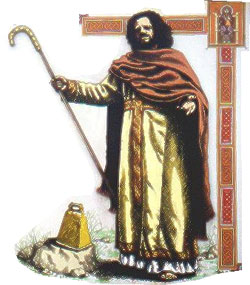As it’s St Fillan’s 900th anniversary I’m looking at Rev. Rutherford’s children’s address, where he talks about the history of the church, this one is for 9th July 1967, here he is talking about St Fillan.

This church has been known as St Fillan’s Church for a very long time. The first record of it s name was in 1390 when James Douglas, Lord of Dalkeith left money to by vestments, gowns for the church of St Fillan at Aberdour.
Who was St Fillan and how did he become a saint? It is difficult to discover, for there were three or four St Fillan’s connected with Scotland. It is little wonder that and some of the stories of one get attached to another. Probably the St Fillan who lived at St Fillan’s in Perthshire is the one connected to our church.
He was born in Ireland around 1500 years ago and his father was a king. When he was still young he decided he wanted to tell others abut Jesus. Later he went with a group to spread the message to the fierce Picts in Scotland who had never heard of Jesus. He settled near Comrie, we are not sure how far he travelled or if he came to Aberdour. He died in 520 A.D. and his memory was not forgotten.
One thing we do know that his name was just a nick-name, it either neant he was a stammerer or a leper, or both. It is wonderful to think of this man whose work was so revered was a man with these afflictions. He could have used these as an excuse not to carry the message of Jesus, saying his stammer or skin disease would put people off.